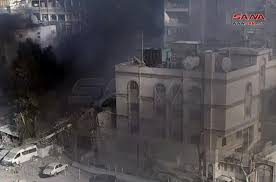Once one of Damascus’ most prestigious neighbourhoods, Mezzeh has shifted from a symbol of sophistication to a flashpoint in Syria’s complex regional conflict. In recent years, increased militarization—driven by Iranian and Hezbollah presence—has made Mezzeh a target of Israeli airstrikes, disrupting daily life and eroding the neighbourhood’s allure. Originally known for its diplomatic institutions, embassies, and exclusive residential zones, Mezzeh’s transformation illustrates how the Syrian war has reached into even the most established areas of the capital.
A Neighborhood Under Fire
Malik, a local resident, decided to sell his home near the Art House Hotel due to ongoing strikes that target high-profile figures from Lebanese Hezbollah and Iran’s Revolutionary Guard Corps (IRGC) residing in the area. Unable to secure a buyer, Malik has lowered his price amidst dwindling demand and a surging supply, as many homeowners seek safer ground.
Mezzeh Neighborhood in Damascus: In the Crosshairs of Israeli Strikes
From its early days as a peaceful village on Damascus’ outskirts, Mezzeh expanded into one of the capital’s key neighbourhoods, encompassing embassies and official buildings within an area of over 7,750 hectares. Yet, this urban growth has come at a cost. Since the Syrian conflict erupted in 2011, Mezzeh has drawn Hezbollah leaders and Iranian military personnel, keen on securing a foothold close to critical sites such as Mezzeh Military Airport.
Security analysts highlight that Iran’s strategic choice of Mezzeh—home to embassies and critical infrastructure—provides logistical advantages and proximity to military facilities, thus enabling these forces to maneuver within Damascus. This concentration of Iranian influence, however, has also made Mezzeh a focal point for Israeli strikes, as seen in early April when Israel bombed the Iranian embassy, killing Brigadier General Mohammad Reza Zahedi and other senior Iranian officers stationed nearby.
The Escalating Conflict
This October alone, Mezzeh has witnessed multiple Israeli air raids, including a devastating attack on October 8 targeting “Axis of Resistance” leaders in the area. The assault resulted in civilian and military casualties, including the deaths of two Hezbollah members and an Iranian advisor. Earlier in the month, a targeted explosion in Mezzeh Western Villas took the lives of five people, among them Hassan Nasrallah’s son-in-law. The persistent violence has strained the lives of Mezzeh’s residents, leaving them anxious about new attacks and a potential escalation of hostilities.
The Real Estate Exodus
Repeated airstrikes have spurred many Mezzeh residents to consider relocating. Ms. Taj, a Mezzeh Filat resident, finally listed her house for sale, persuaded by her sister’s insistence on leaving despite her initial hesitation. While the strikes focus on Iranian military and Hezbollah targets, residents experience heightened anxiety from the near-constant threat of attacks. This distress has led to an unprecedented real estate downturn, with properties offered at significantly reduced prices. According to Al-Ahmad Real Estate, the neighbourhood’s market is in “paralyzing stagnation,” with supply outstripping demand as families seek safer neighborhoods.
As Israel continues to target Iranian and Lebanese operatives, Mezzeh’s atmosphere grows increasingly tense. What was once a sought-after residential and diplomatic enclave now feels like a zone in perpetual conflict, with residents facing pressure to abandon their homes. For many, this forced displacement signals not only a change in demographics but also a restriction on personal freedoms and stability—adding a new layer of hardship to daily life.
In Mezzeh, a neighbourhood reshaped by geopolitical stakes, the lives of ordinary people are caught in a struggle that has fundamentally altered their community.
This article was translated and edited by The Syrian Observer. The Syrian Observer has not verified the content of this story. Responsibility for the information and views set out in this article lies entirely with the author.


